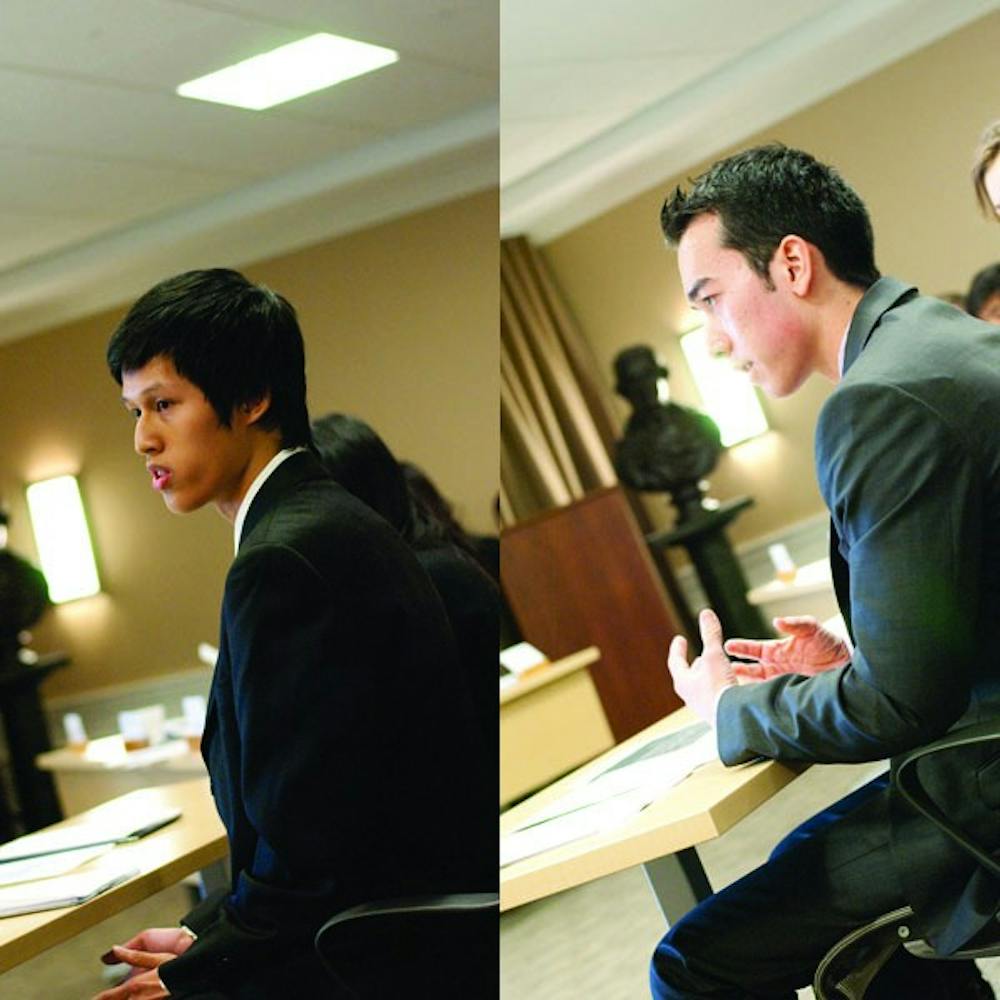Sitting two rows behind third-year College students Alexander Stamey and Kevin Nguyen, their classmate could see them shuffling papers and whispering back and forth during an exam.
In just the third open honor trial in a decade, an honor panel Sunday evening expelled Stamey and Nguyen on charges of collaboration and cheating.
Every individual accused of an honor offense has the option of a public trial, but few choose to exercise that right. “It’s up to them to decide whether or not they’d like to waive their right to confidentiality,” Honor Committee Chair Stephen Nash said.
Their classmate, Medical graduate student Troy Nold, reported the pair to his teaching assistant during the third exam of Biology 2020 in March this year. Nold filed the incident as an honor offense in April. When the teaching assistant collected their exams, their exam papers had 49 out of 50 identical answers — a statistically improbable number — the Counsel for the Community, or prosecution, argued.
Much of Sunday’s hearing came down to Stamey and Nguyen’s word against the eye-witness reports of two teaching assistants and Nold.
Stamey and Nguyen maintained they had neither whispered during the exam nor exchanged any information about the test answers.
Two of the four eye-witnesses called by the Counsel for the Accused gave sworn statements that they did not witness any acts of cheating. The teaching assistants and Nold maintained that they had seen the pair cheating. Two of the four eye-witnesses presented by the Counsel for the Accused — all of whom had personal ties to the pair — said they had not seen any suspicious behavior, although one said he had seen another couple collaborating.
“I studied very hard for the exam with Alex,” Ngyuen said in a statement. “We read through each chapter and quizzed each other so that we would understand all the concepts.”
Nguyen and Stamey shared notes and used the same supplement to the textbook — “Mastering Biology” — to which they said most of the class did not have access.
“I guess from that reasoning we would develop a pattern of answering a certain way, and I think that’s how the similarity can be explained,” Stamey said during the trial.
The two also pointed to the inconsistencies in the teaching assistants’ accounts of events, as neither teaching assistant could definitively identify the exact seats where Stamey and Nguyen took the exam.
Nold did not in fact sit directly behind the pair, as stated in pretrial documents. Ngyuen and Stamey sat in the third row from the back, not the second, the pair said.
The Counsel for the Accused said it was “possible and likely that the witnesses misinterpreted” what they saw.
Although the trial was open to the public, the two-hour jury deliberations were closed. The jury voted first with consideration as to whether the pair committed an act of cheating with knowledge, and then on the act’s significance.
The jury needed a 4/5 vote of guilty to say that the pair has committed an act of cheating with knowledge, and a simple majority to prove that the act was significant.
“The jury looked at the degree of collaboration between students, and they also looked at each student’s individual action and role in the incident in reaching their decision,” Vice Chair for Trials Clifton Bumgardner said.
The jury was actively engaged in the process, asking insightful questions throughout the trial.
“This is a jury that fairly considered the criteria of an honor offense and did not put undue emphasis on the outcome,” Bumgardner said. “It’s not an example of the juries we sometimes see, who are unwilling to consider full facts of the case because they are unwilling to see a student expelled.”
Nguyen and Stamey have until Wednesday to file an expedited appeal if they provide good cause that there was some unfairness in the original trial or if new evidence comes to light.
—an original version of the article incorrectly stated that two-thirds of witnesses had not seen Stamey and Nguyen collaborate, but in fact two of the four witnesses called by the Counsel for the Accused gave sworn statements that they did not witness any acts of cheating.







